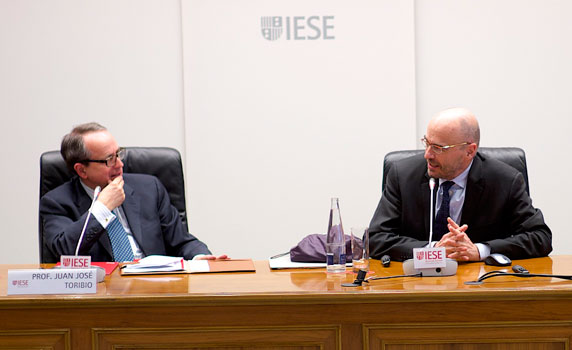
The global economy will grow 3.5 percent in 2015. And Economic conditions in the Eurozone will also improve this year thanks to a push from countries on the periphery. In the meantime, Spain, which has overcome the worst of the crisis, is expected to enjoy growth at around 2.5 percent.
These were some of the issues analyzed by IESE economics professors Juan José Toribio, Javier Díaz-Giménez and Rolf Campos in a continuous education session organized by the Alumni Association.
The decrease in oil prices and the fall of the euro against the dollar have been key factors in the world economy in recent months. Brazil, Russia and the U.S. have lost growth momentum, while the countries of the Eurozone have improved forecasts for this year.
The latest IMF World Economic Outlook Update predicts a rebound in the four large euro-based economies: Germany, France, Italy and Spain. Spain will lead this growth, at 2.5 percent.
In spite of this context of cautious optimism, a crucial question remains unanswered: What about Greece?
Greece: To Stay or Not To Stay?
“We should forgive Greece’s debt. We can’t force a democratic country to make reforms against its will,” insisted Díaz-Giménez. “Greece isn’t solely responsible for the desperate situation it finds itself in. Lenders made serious miscalculations when they issued credit,” he explained.
Díaz-Giménez argued that a possible Greek exit from the euro would be bad not only for the Greek economy, but for the entire Eurozone.
“It would call into question the viability of the single currency,” he said, causing a “domino effect.” Díaz-Giménez sees the cost of the bailout for Greece as “intolerable.”
“The bailout has devastated the country and Europe should not allow this to happen. Greece’s debt won't be paid. The debt needs to be either reduced or pooled.”
Arguing from the opposite end of the spectrum was Professor Juan José Toribio, who said that Alexis Tsipras’s government should meet Greece’s commitment to pay back the 260 billion euros that it borrowed.
Greece had reduced its debt by 6% in recent years, he said, thanks to “the wisdom of the troika” and the efforts of the previous regime. Things have changed since Syriza’s win, he added. “Greece has to recognize that for a long time, its public sector spent a lot more money than it generated. Debts have to be paid.”
Rolf Campos pointed out that the root of the Greek drama is the country’s insolvency. “Greece is bankrupt. Europe has turned a solvency problem into a liquidity problem," he said. And this, despite the country’s 175 billion euro default in 2012 – the largest in world history.
Spain’s Projected Recovery
All three experts agreed that the Spanish economy has improved substantially in the last year, although they each expressed some reservations.
Díaz-Giménez noted that Spain owes its growth to external factors, like dropping petroleum prices and interest rates and increasing tourism due to instability in northern Africa. He also cited the most recent Survey of Economically Active People (EPA), which reveals that there are 5,444,600 people still unemployed in Spain. Lamenting Spain’s on-going difficulty in “creating high-quality employment,” he also warned of an “accumulated debt and an enormous public deficit” – already standing at 97.7 percent. “The key is normalizing the Spanish labor market,” he asserted.
Juan José Toribio recognized that Spain doesn’t have “lot of room” for further reforms; reforms, he said, that have either already been made, or which “depend on Europe.”
At the same time, he listed a series of factors that could affect the national economy in the coming months. Among these were monetary distortions, elections, public debt accumulation – and the future of Greece.
 |